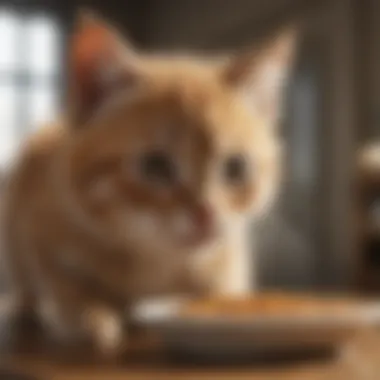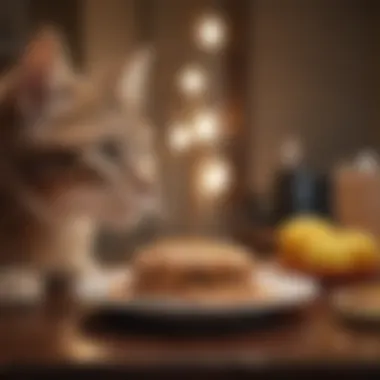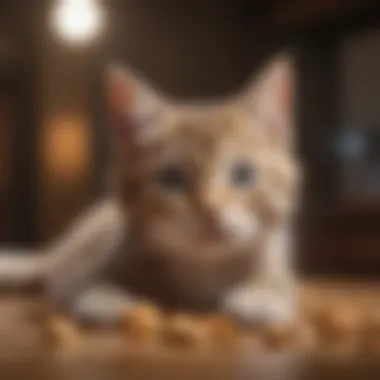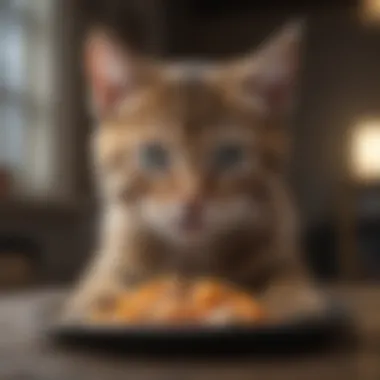Essential Guidelines for a Nutritious Diet for Your 8-Month-Old Kitten


Pet Care Essentials
Your 8-month-old kitten's diet is a crucial aspect of ensuring its well-being and longevity. Proper nutrition is key to their growth and development as they transition from kittens to adult cats. Understanding the daily nutritional requirements, exercise needs, grooming tips, and health check-ins is vital to providing a healthy lifestyle for your furry companion. By incorporating these essentials into your pet care routine, you can contribute significantly to your kitten's overall health and happiness.
Daily Nutrition Requirements
At 8 months old, your kitten's diet should consist mainly of premium quality kitten food that is rich in essential nutrients such as protein, vitamins, and minerals. Ensure that the food is suitable for their age group and supports their rapid growth. It's essential to provide a balanced mix of proteins, fats, and carbohydrates to meet their energy needs and promote muscle development. Additionally, fresh water should be readily available at all times to keep your kitten hydrated.
Exercise and Playtime
Exercise is crucial for your kitten's physical and mental well-being. Engage your 8-month-old kitten in daily play sessions to promote agility, coordination, and muscle development. Interactive toys, scratching posts, and climbing structures can help satisfy their natural hunting instincts and keep them mentally stimulated. Regular playtime not only strengthens the bond between you and your pet but also prevents obesity and other health issues.
Grooming Tips
Grooming your kitten is an essential part of their care routine. Brush their coat regularly to prevent matting and distribute natural oils that keep their fur healthy and shiny. Trim their claws to avoid overgrowth and provide scratching posts to help maintain nail health. For long-haired breeds, consider professional grooming to manage their coat and prevent tangles. Additionally, routine ear and dental hygiene are crucial for overall cleanliness and health.
Health and Wellness Check-ins
Regular veterinary check-ups are crucial for monitoring your kitten's health and addressing any potential issues proactively. Vaccinations, deworming, and fleatick prevention should be administered as per the vet's recommendations. Observing changes in your kitten's appetite, behavior, litter box habits, or physical appearance can help detect health concerns early. Keep a record of their vaccinations and medical history for quick reference during vet visits.
Understanding Your 8-Month-Old Kitten's Dietary Needs
When it comes to your 8-month-old kitten's dietary needs, a balanced and nutritious diet plays a vital role in ensuring their optimal health and development. Understanding what your kitten requires at this stage is crucial to meeting their specific nutritional needs. From determining portion sizes to selecting the right food types, this section will delve into the intricacies of providing a diet that caters to your feline friend's well-being.
Factors Influencing Food Requirements
Metabolic Rate
The metabolic rate of your 8-month-old kitten refers to how fast their body processes nutrients and energy. This aspect is critical as it determines the amount of food your kitten needs to maintain energy levels and support growth. Understanding your kitten's metabolic rate helps tailor their diet to prevent overfeeding or underfeeding, ensuring they receive the necessary nutrients for their overall health.
Activity Level
Your kitten's activity level plays a significant role in determining their food requirements. Actively playful kittens may need more calories to fuel their energetic pursuits, while calmer kittens may require a different feeding regimen. By considering your kitten's activity level, you can adjust their diet to match their energy expenditure, promoting a healthy balance between food intake and activity.
Growth Stage
At 8 months old, your kitten is still in a critical growth stage where proper nutrition is essential for bone development, muscle growth, and overall well-being. Their diet should reflect the need for nutrients that support their growth phase, ensuring they receive a balanced combination of proteins, fats, carbohydrates, vitamins, and minerals. Understanding how the growth stage influences their food requirements enables you to provide a diet that fosters their development effectively.
Importance of Balanced Nutrition
Proteins
Proteins are essential for your 8-month-old kitten's growth and maintenance of bodily functions. They provide the necessary building blocks for lean muscle development and overall health. Including high-quality protein sources in your kitten's diet supports their active lifestyle and ensures they receive adequate nourishment for their muscles and organs to thrive.
Fats


Fats are another crucial component of your kitten's diet, serving as a concentrated source of energy and promoting healthy skin and coat. By incorporating appropriate amounts of healthy fats into their meals, you can help regulate your kitten's body temperature, support cell function, and enhance the absorption of fat-soluble vitamins for overall well-being.
Carbohydrates
While kittens primarily require proteins and fats, carbohydrates also play a role in providing energy and fiber for digestive health. Opt for complex carbohydrates from sources like grains and vegetables to sustain your kitten's energy levels and support their digestive system. Balancing carbohydrates in their diet contributes to a well-rounded nutrition plan for your 8-month-old kitten.
Vitamins and Minerals
Vitamins and minerals are essential nutrients that aid in various bodily functions, from immune system support to bone development. Ensuring your kitten receives an adequate intake of vitamins like A, E, and D, as well as minerals such as calcium and phosphorus, helps maintain their overall health and prevents nutritional deficiencies. Include a diverse range of nutrient-rich foods to provide your kitten with the vitamins and minerals they need for optimal growth and well-being.
Common Nutritional Deficiencies in Kittens
Taurine
Taurine is a key amino acid that cats, including kittens, require for heart health, vision, and reproductive function. A deficiency in taurine can lead to serious health issues, making it essential to include taurine-rich foods in your kitten's diet. By understanding the importance of taurine and its role in your kitten's well-being, you can mitigate the risk of deficiencies and promote their long-term health.
Certain Amino Acids
Certain amino acids, such as arginine and methionine, are crucial for your kitten's growth and metabolic processes. These building blocks of protein play vital roles in muscle development, tissue repair, and enzyme function. Incorporating foods that are rich in essential amino acids ensures your kitten receives a complete and balanced diet, supporting their overall health and vitality.
Essential Fatty Acids
Essential fatty acids, particularly omega-3 and omega-6 fatty acids, are essential for your kitten's skin health, coat condition, and inflammatory response. Including sources of essential fatty acids like fish oil or flaxseed in your kitten's diet helps maintain their skin barrier function, reduce inflammation, and promote a shiny coat. By addressing the need for essential fatty acids, you can enhance your kitten's overall well-being and appearance.
Determining the Right Portion Sizes for Your Kitten
In this article, understanding the importance of determining the right portion sizes for your 8-month-old kitten is crucial for its overall health and well-being. Ensuring your kitten receives the appropriate amount of food plays a significant role in supporting its growth, development, and energy levels. Factors such as metabolic rate, activity level, and growth stage influence the amount of food your kitten requires. By accurately determining the portion sizes, you can prevent overfeeding or underfeeding, which are detrimental to your kitten's health.
Caloric Requirements
Guidelines for Daily Caloric Intake
Delving into the specifics of guidelines for daily caloric intake is vital in providing your 8-month-old kitten with the necessary energy it needs to thrive. Understanding the ideal caloric intake based on your kitten's weight, activity level, and quality of food ensures they receive adequate nutrition for growth and maintenance. By following these guidelines, you can prevent issues like obesity or nutritional deficiencies, promoting a healthy and active lifestyle for your feline companion.
Adjustments for Spayed or Neutered Cats
Exploring the adjustments needed for spayed or neutered cats is essential in tailoring your kitten's diet to their altered metabolic needs. After the surgical procedure, cats may require fewer calories to maintain a healthy weight. Adapting the caloric intake accordingly can prevent weight gain and associated health issues. Understanding the nuances of feeding spayed or neutered kittens facilitates optimal nutrition and weight management, leading to a healthier and happier pet.
Factors to Consider
Kitten's Weight
Considering your kitten's weight is a fundamental aspect of ensuring they receive the right portion sizes of food. The weight of your 8-month-old kitten influences their daily caloric requirements, with heavier kittens needing more food to sustain themselves. Monitoring your kitten's weight and adjusting their diet accordingly helps in preventing obesity or malnutrition, supporting their overall health and vitality.
Activity Level
Taking into account your kitten's activity level is crucial in determining the appropriate portion sizes for their meals. Active kittens with high energy expenditure may require more calories compared to less active counterparts. By aligning their food intake with their activity level, you can provide them with the energy needed for play, growth, and maintaining a healthy weight.


Quality of Food
The quality of food your kitten consumes is paramount in establishing the right portion sizes for their diet. High-quality, nutritious food ensures that your kitten receives essential nutrients without excess fillers or additives. Opting for premium cat food brands that prioritize quality ingredients supports your kitten's overall health and development, contributing to their well-being and longevity.
Monitoring Your Kitten's Body Condition
Healthy Weight Indicators
Recognizing healthy weight indicators in your 8-month-old kitten is key to assessing if they are receiving the correct portion sizes of food. Physical cues such as a visible waistline, the ability to feel but not see their ribs, and an active demeanor indicate that your kitten is at a healthy weight. Monitoring these indicators allows you to adjust their diet accordingly, ensuring they maintain an ideal body condition.
Signs of Overfeeding or Underfeeding
Being aware of the signs of overfeeding or underfeeding in your kitten helps in fine-tuning their portion sizes for optimal nutrition. Symptoms like obesity, lack of interest in food, or rapid weight loss indicate feeding imbalances that need to be addressed. By observing these signs and adjusting their diet promptly, you prevent health issues associated with improper feeding practices, fostering a happy and healthy lifestyle for your beloved pet.
Selecting the Right Food for Your 8-Month-Old Kitten
Selecting the right food for your 8-month-old kitten is a critical aspect to ensure their proper growth and development. The diet you choose plays a significant role in their overall health and well-being. It is essential to consider various factors such as the nutritional content, quality, and suitability of the food for your kitten's age and specific requirements. By selecting the appropriate food, you can support your kitten's immune system, digestion, and energy levels effectively.
Types of Cat Food
Dry Kibble
Dry kibble is a popular choice among cat owners due to its convenience and long shelf life. This type of food is nutritionally balanced and provides essential nutrients for your kitten's growth. The key characteristic of dry kibble is its crunchy texture, which also helps in promoting dental health by reducing plaque and tartar buildup. While dry kibble is convenient, some kittens may not consume an adequate amount of water, so ensuring they have access to water at all times is crucial for hydration.
Canned Food
Canned food is another option for your kitten, offering high moisture content and palatability. The key characteristic of canned food is its rich texture and strong aroma, which can be more appealing to picky eaters. Canned food provides essential hydration and can be easier to consume for kittens with dental issues or those who struggle to drink enough water. However, it is important to monitor portion sizes to prevent overfeeding.
Semi-Moist Food
Semi-moist food provides a middle ground between dry kibble and canned food, offering convenience and palatability. The key characteristic of semi-moist food is its soft texture, making it easier for kittens to chew and digest. However, some semi-moist foods may contain higher levels of additives and artificial preservatives, so selecting high-quality options is essential for your kitten's health.
Raw Diet
A raw diet consists of uncooked ingredients such as meat, bones, and organs, mimicking a cat's natural diet in the wild. The key characteristic of a raw diet is its high protein content and minimal processing, which can benefit the overall health and vitality of your kitten. While a raw diet can provide essential nutrients, it is crucial to consult with a veterinarian to ensure the diet is balanced and safe for your kitten to consume.
Reading Labels and Ingredients
Understanding Nutritional Information
Understanding the nutritional information on cat food labels is crucial for selecting the right food for your kitten. Key details such as protein content, essential vitamins, and mineral levels can help you make an informed decision. By understanding the nutritional information, you can ensure that your kitten's diet meets their specific dietary needs and supports their growth and development.
Avoiding Harmful Additives
Many commercial cat foods may contain harmful additives such as artificial colors, flavors, and preservatives. Avoiding these additives is essential to prevent potential health issues in your kitten. Opting for natural and minimally processed foods can reduce the risk of allergic reactions, digestive issues, and other complications that may arise from consuming additives.
Transitioning Between Foods


Gradual Introduction Process
When transitioning your kitten between different types of food, a gradual introduction process is recommended to prevent digestive upset. Start by mixing small amounts of the new food with their current food and gradually increasing the proportion over several days. This gradual transition allows your kitten's digestive system to adjust to the new food and reduces the chances of stomach upset.
Signs of Digestive Upset
Monitoring your kitten for signs of digestive upset during a food transition is essential. Common signs include vomiting, diarrhea, lethargy, and decreased appetite. If you notice any of these symptoms, it is crucial to consult with your veterinarian immediately. By recognizing and addressing digestive upset early on, you can ensure a smooth transition between foods for your kitten's optimal health.
Additional Considerations for Feeding Your Kitten
Feeding your 8-month-old kitten goes beyond just providing meals. The section of Additional Considerations for Feeding Your Kitten delves into crucial aspects that impact your feline friend's overall well-being. Just like humans, cats require proper hydration to maintain good health and vitality. A key factor in ensuring your kitten's health is addressing their hydration needs. Understanding the importance of water intake for your kitten is essential to prevent dehydration and promote optimal bodily functions. By focusing on hydration, you can support your kitten's kidney function, digestion, and overall health. Hence, discussing hydration needs becomes a pivotal aspect of this article.
Hydration Needs
Impact of Water Intake
Hydration plays a significant role in maintaining your kitten's health. The impact of water intake on their overall well-being cannot be understated. Adequate hydration contributes to various bodily functions, including temperature regulation, nutrient transportation, and waste elimination. Water serves as a vital component in supporting your kitten's kidney function by assisting in filtering waste and toxins from their body. Moreover, proper hydration aids in preventing urinary tract issues and supports healthy digestion. Emphasizing the importance of adequate water intake can help prevent dehydration-related health problems in kittens, making it a crucial element in their diet.
Signs of Dehydration
Recognizing the signs of dehydration is paramount for pet owners. Dehydration can lead to serious health complications in kittens if left untreated. Common signs of dehydration in kittens include dry gums, lethargy, sunken eyes, and reduced skin elasticity. Monitoring these indicators can help you identify dehydration early and take necessary actions to rehydrate your kitten. Being aware of these signs equips you to provide immediate care and prevent dehydration-related complications. Thus, understanding the signs of dehydration is essential for maintaining your kitten's health and well-being.
Treats and Supplements
When it comes to feeding your kitten, the role of treats and supplements cannot be overlooked. Moderation and nutritional balance are key principles in offering treats to your kitten. Providing occasional treats in moderation can be a way to reinforce positive behavior and create enriching experiences for your pet. However, it is important to consider the nutritional content of treats to avoid imbalance in their diet. Ensuring treats align with your kitten's dietary needs promotes overall health and prevents adverse effects of excess calorie intake.
Consulting with a Veterinarian
Consulting with a veterinarian is a valuable resource for pet owners seeking professional advice on their kitten's diet. Veterinarians can provide tailored recommendations based on your kitten's specific requirements and health conditions. By seeking guidance from a veterinarian, you can address any concerns regarding your kitten's nutritional needs and make informed decisions about their diet. Veterinarians offer expert knowledge and insight into feline nutrition, helping you optimize your kitten's diet for their age and health status. Establishing a relationship with a veterinarian ensures comprehensive care for your kitten and promotes their long-term well-being.
Monitoring and Adapting Your Kitten's Diet
In the realm of feline care, monitoring and adapting your kitten's diet assumes a pivotal role in ensuring its well-being and vitality. Regular veterinary check-ups are indispensable to track your kitten's dietary needs and potential adjustments. These check-ups serve as comprehensive evaluations of your kitten's health status and dietary requirements. Making this practice habitual can aid in preempting any issues that may arise due to dietary deficiencies or incorrect feeding patterns, thus promoting a robust and balanced lifestyle for your growing pet. Embracing this proactive approach can safeguard your kitten's health and longevity, providing you with peace of mind as a diligent caretaker.
Regular Veterinary Check-Ups
Dietary Recommendations
Delving into the specifics of dietary recommendations unveils a tailored approach to address your kitten's unique dietary requisites. These recommendations are crafted to ensure a harmonious blend of essential nutrients that bolster your kitten's growth and overall health. By adhering to these recommendations, you can rest assured that your kitten receives a nutritionally sound diet that caters to its developmental milestones. Their formulation takes into account factors such as age, weight, and health history, culminating in a bespoke dietary plan curated for your furry companion. This individualized approach underscores the significance of personalized dietary guidance in nurturing a thriving and healthy kitten for years to come.
Weight Management
Weight management plays a crucial role in maintaining your kitten's health and vitality at optimal levels. By focusing on weight management during veterinary check-ups, you can proactively address any fluctuations or concerns regarding your kitten's weight. This facet of veterinary care emphasizes the importance of striking a balance in your kitten's diet to prevent issues such as obesity or malnourishment. A tailored weight management plan can not only optimize your kitten's physical well-being but also contribute to its overall quality of life. Engaging in discussions with your veterinarian regarding weight management can illuminate the path to cultivating healthy habits that safeguard your kitten's long-term health.
Response to Food Changes
Digestive Health
In the realm of food changes, digestive health emerges as a critical aspect that impacts your kitten's dietary transition and overall well-being. The seamless functioning of your kitten's digestive system is paramount in ensuring proper assimilation of nutrients and fostering digestive comfort. Prioritizing digestive health entails selecting food options that align with your kitten's digestive sensitivities and gradual introduction of new dietary components to avert any gastrointestinal distress. By attentively monitoring your kitten's digestive responses to food changes, you can tailor its diet to support optimal digestion and nutrient absorption, culminating in a thriving and contented pet.
Energetic Levels
Energetic levels epitomize your kitten's vitality and zest for life, reflecting its overall health and well-being. Understanding and monitoring your kitten's energetic levels offer insights into its physical activity, enthusiasm, and overall vigor. Adjusting your kitten's diet in response to energy fluctuations can optimize its stamina and liveliness, ensuring a balanced and fulfilling lifestyle. By observing and adapting to your kitten's energetic cues, you can fine-tune its diet to sustain optimal energy levels and enliven its daily adventures, fostering a harmonious coexistence between you and your lively companion.







